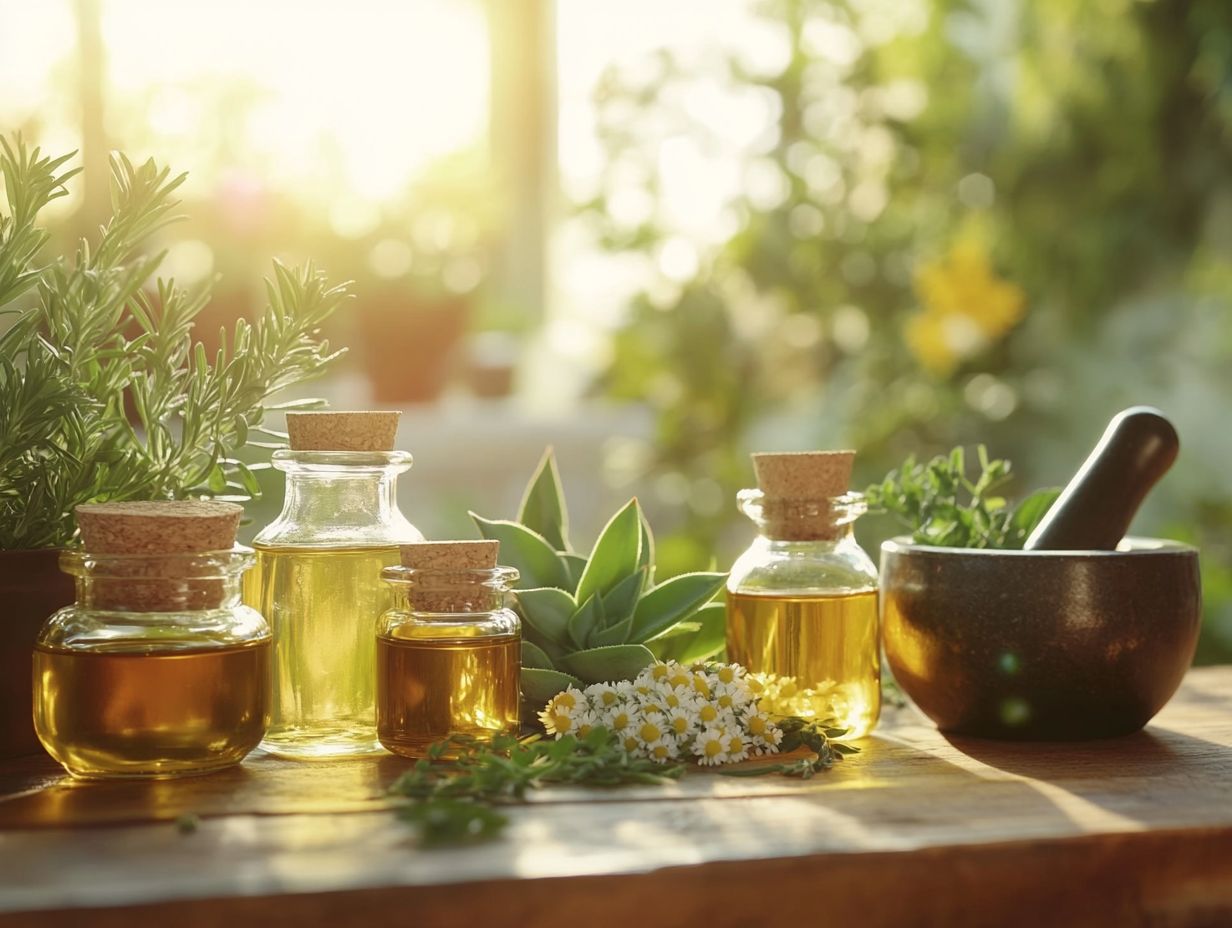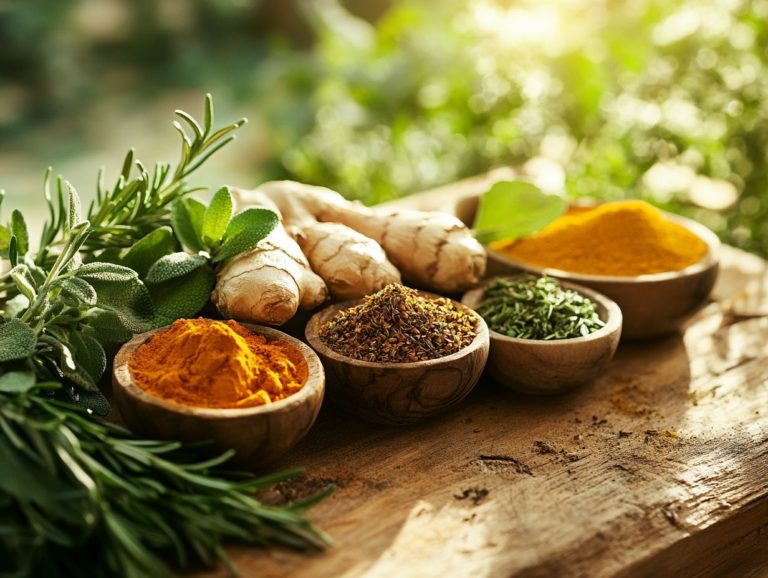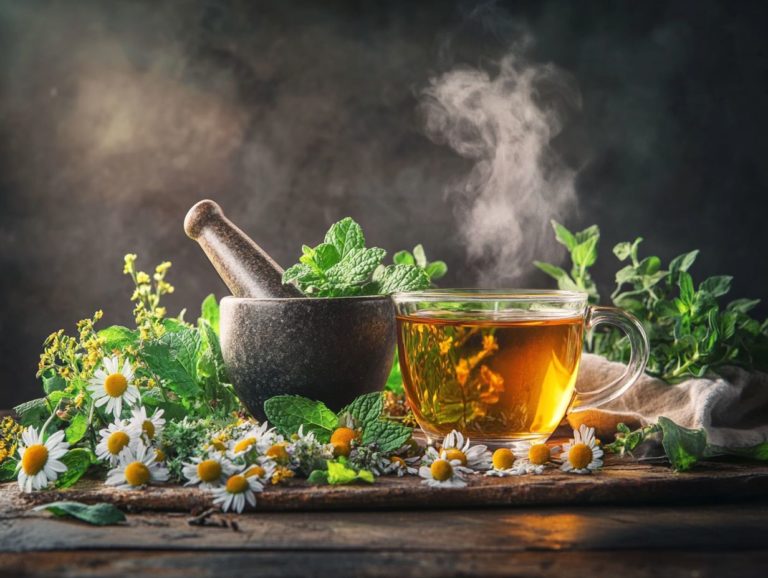5 Herbal Remedies for Skin Conditions
In a world overflowing with skincare choices, herbal remedies stand out as a luxurious natural alternative for treating various skin conditions.
This article delves into five powerful herbal ingredients Aloe Vera, Turmeric, Tea Tree Oil, Neem, and Chamomile that have long been revered for their remarkable healing properties. You ll uncover how these remedies work, the specific skin issues they can address, and the most effective ways to weave them into your skincare routine.
You will also find insights on side effects and precautions, ensuring a safe and enriching experience.
Unlock the secret to vibrant skin with nature’s powerful remedies today!
Contents
- Key Takeaways:
- 1. Aloe Vera
- 2. Turmeric
- 3. Tea Tree Oil
- 4. Neem
- 5. Chamomile
- What Are Herbal Remedies and How Do They Work?
- What Are the Different Types of Skin Conditions That Can Be Treated with Herbal Remedies?
- How Can These Herbal Remedies Help with Skin Conditions?
- What Are the Possible Side Effects of Using Herbal Remedies for Skin Conditions?
- How Can One Incorporate These Herbal Remedies into Their Skincare Routine?
- Are There Any Precautions to Take When Using Herbal Remedies for Skin Conditions?
- Frequently Asked Questions
- What are the five best herbal remedies for treating skin conditions?
- What is aloe vera and how does it help with skin conditions?
- How does tea tree oil benefit the skin?
- Can chamomile help with skin conditions?
- What is calendula and how does it help the skin?
- How can turmeric be used to treat skin conditions?
Key Takeaways:

Aloe Vera is a versatile herbal remedy that can help soothe and heal various skin conditions, such as sunburns, eczema, and psoriasis.
Turmeric, with its anti-inflammatory and antioxidant properties, can be used topically or ingested to treat skin conditions like acne, rosacea, and scarring.
Tea Tree Oil has antimicrobial and anti-inflammatory properties, making it an effective herbal remedy for treating acne, fungal infections, and dandruff.
1. Aloe Vera
Aloe vera is an extraordinary healing plant that boasts soothing properties and therapeutic benefits for a range of skin conditions. This makes it a sought-after ingredient in natural remedies for health and beauty.
Rich in vitamins, aloe vera not only promotes healing but also tackles inflammation and acne. It enhances your overall skin health and offers effective home treatment solutions for a better skin appearance.
For centuries, its gel has been cherished by ancient civilizations for its prowess in treating wounds and infections. The plant’s anti-inflammatory properties work wonders in reducing redness and swelling, making it a go-to remedy for soothing irritated skin.
Boost your skincare routine now! Whether you choose a pure gel or a cream infused with its essence, you can enjoy natural hydration and nourishment effortlessly.
Given its rich history in herbal medicine, it’s no wonder aloe vera continues to be a staple in both contemporary and traditional home remedies, catering to various skin types and conditions.
2. Turmeric
Turmeric, that golden spice you might have heard about, is celebrated for its impressive anti-inflammatory properties. It has truly carved out a niche in the world of natural remedies, especially when it comes to skin health.
The active ingredient in turmeric does more than just soothe skin inflammation; it also holds promise for tackling acne and enhancing your skin’s overall appearance. This makes it an excellent addition to your home treatment routines.
Turmeric has a long history in Ayurvedic and Chinese medicine, showcasing its many healing powers. Its rich history highlights its culinary versatility and effectiveness in addressing various skin conditions.
When you incorporate turmeric into your topical treatments, you may discover relief from issues like psoriasis and dermatitis. It works to calm irritated skin and diminish redness.
The antioxidant properties of turmeric add an extra layer of defense, especially beneficial for those grappling with chronic skin concerns. This promotes a healthier complexion and potentially wards off further flare-ups.
3. Tea Tree Oil
Tea tree oil stands out as a powerhouse essential oil, renowned for its antibacterial and antiviral properties. This makes it an excellent option for addressing various skin issues, especially acne.
This natural remedy, extracted from the leaves of the Melaleuca alternifolia plant, is celebrated for its remarkable ability to combat skin infections and inflammation. It offers a holistic approach to your skincare regimen.
As it penetrates deeply into the skin, tea tree oil helps unclog pores and diminish redness. This provides invaluable support for anyone facing breakouts.
Its antifungal properties also make it a formidable ally against athlete’s foot and other fungal infections. When combined with other natural ingredients like aloe vera or coconut oil, tea tree oil amplifies its soothing effects.
Many individuals find great success by incorporating this essential oil into their daily skincare routines or blending it with moisturizers and serums. This allows them to achieve clearer skin while embracing the benefits of nature.
4. Neem
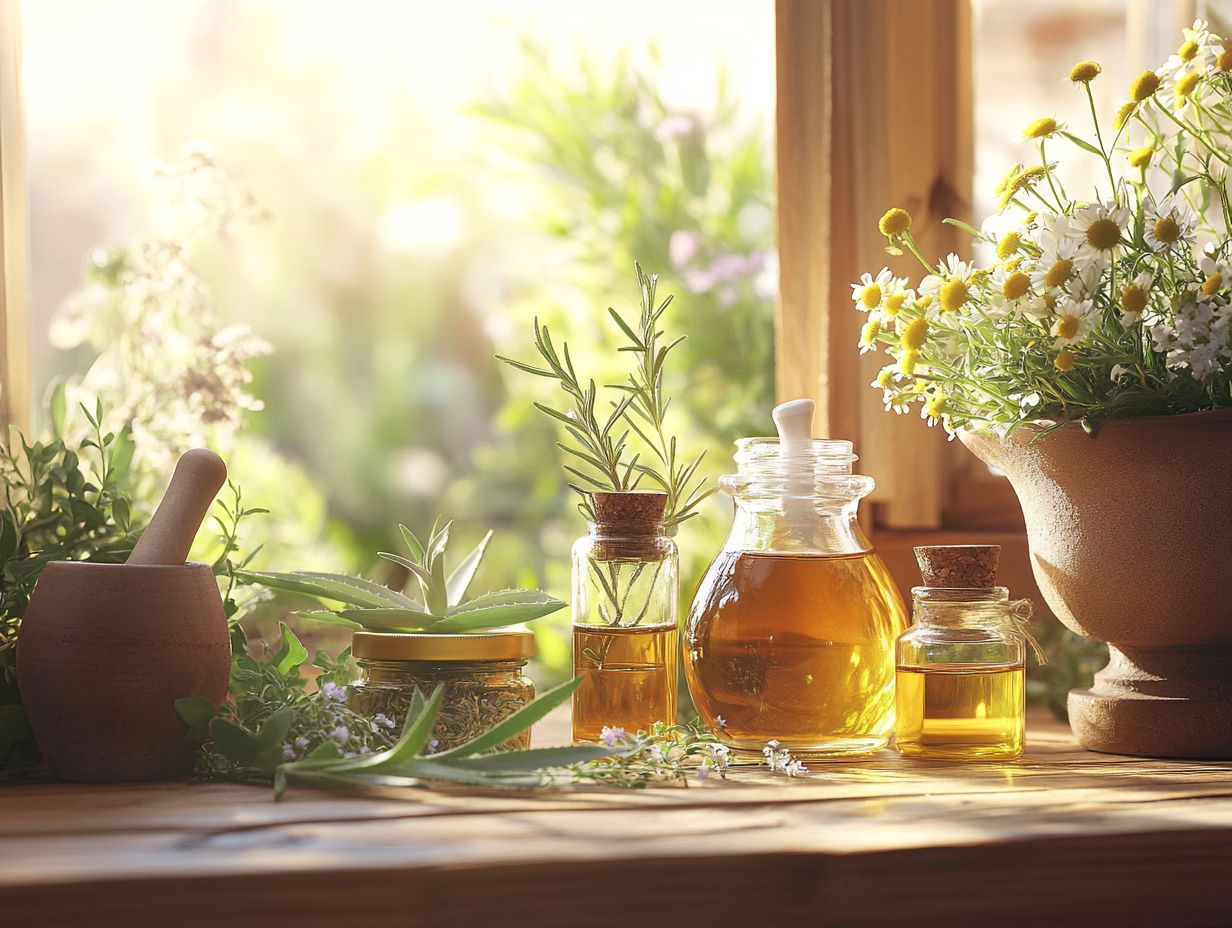
Neem, often called the ‘miracle tree,’ is highly regarded in herbal medicine for its exceptional antibacterial properties and its significant role in improving skin health.
Neem is a go-to solution in natural remedies, effectively addressing various skin problems, from acne to infections. It s known for soothing skin inflammation, making it a perfect choice for home treatments.
The bark, leaves, and oil of neem have been used in traditional practices worldwide, with ancient Ayurvedic and African medicine practitioners utilizing its healing potential for centuries.
If you re looking for relief from chronic issues like eczema or psoriasis, neem’s natural compounds can provide comfort by calming irritation and restoring skin balance.
Incorporating neem into your daily routine is simple whether through herbal infusions, topical creams, or natural soaps, it offers a holistic approach to skincare that combines history with effectiveness.
Many users report that regular application promotes clearer skin and enhances overall well-being.
5. Chamomile
Chamomile, with its delightful fragrance, is more than just a pretty herb; it plays a key role in natural remedies that improve skin health and provide relief from various conditions. Recognized for its anti-inflammatory properties, chamomile effectively alleviates skin irritation, making it ideal for those seeking gentle yet powerful home treatments.
Chamomile also promotes relaxation and reduces stress, harmonizing beautifully with its skincare benefits. This creates a holistic self-care routine that nourishes not just the skin, but also the spirit.
When combined with other natural ingredients like aloe vera or honey, chamomile forms powerful formulations that hydrate and nourish your skin. You can apply it as a soothing ointment or use it in a facial steam, ensuring it s suitable for all skin types, including sensitive skin, paving the way to a healthier, more radiant complexion.
What Are Herbal Remedies and How Do They Work?
Herbal remedies consist of various natural treatments derived from medicinal plants, used for centuries to promote health and wellness through holistic practices.
These remedies use plant extracts like tea tree oil, garlic, and aloe vera to address many health concerns, especially skin problems, due to their anti-inflammatory, antibacterial, and soothing properties.
By taking advantage of nature’s ingredients, these remedies not only target specific ailments but also support your overall well-being by boosting your body s natural healing processes.
The principles of herbal medicine emphasize balance, prevention, and personalized care, enabling you to play an active role in your health journey.
Many individuals find that incorporating these treatments into their wellness routines leads to a transformative experience, bridging the gap between traditional and modern practices. This integration can improve vitality, reduce reliance on pharmaceuticals, and foster a deeper connection to your body and environment.
What Are the Different Types of Skin Conditions That Can Be Treated with Herbal Remedies?
Herbal remedies offer a versatile approach to treating various skin problems, such as acne, inflammation, dermatitis, and psoriasis, by utilizing the natural properties of medicinal plants.
Using the anti-inflammatory and antibacterial qualities of ingredients like turmeric, chamomile, and tea tree oil, you can manage these skin issues without solely relying on conventional treatments.
Tea tree oil could be your new secret weapon against acne, targeting acne-causing bacteria while reducing inflammation. Chamomile, known for its soothing abilities, can calm irritated skin and reduce redness linked to dermatitis.
If psoriasis is your concern, turmeric could be your ally; its curcumin compound has powerful anti-inflammatory effects that help regulate your immune response.
Each of these natural ingredients harnesses the power of nature, enhancing skin health and promoting a radiant complexion while minimizing potential side effects.
How Can These Herbal Remedies Help with Skin Conditions?
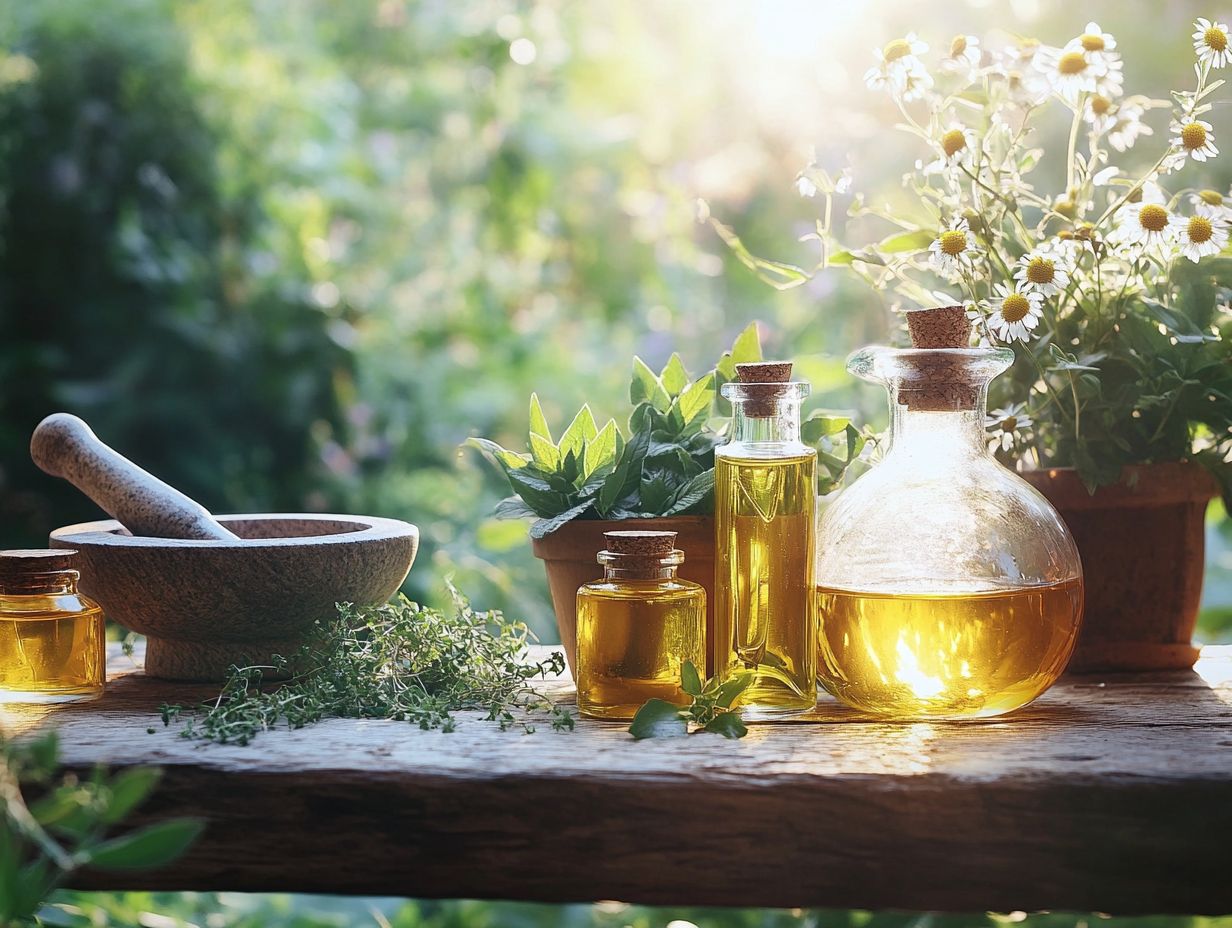
Herbal remedies can transform how you manage skin conditions by harnessing the natural anti-inflammatory and antibacterial properties of plants. For inspiration, consider exploring 5 herbal remedies to try this winter.
Ingredients like aloe vera, tea tree oil, and turmeric work wonders. They reduce inflammation and promote healing, making them excellent allies for clearer skin.
Aloe vera is rich in natural sugars that hydrate and soothe irritated skin. It promotes cell regeneration, helping your skin look fresh and healthy.
Tea tree oil contains a compound that has remarkable antimicrobial properties. It effectively tackles the bacteria responsible for acne, keeping your skin in great shape.
Turmeric is another fantastic option. Its curcumin-rich profile acts as an anti-inflammatory agent and has antioxidant qualities, brightening your complexion and reducing pigmentation.
Together, these natural remedies offer a comprehensive approach. They enhance your skin s resilience and facilitate a gradual healing journey.
What Are the Possible Side Effects of Using Herbal Remedies for Skin Conditions?
While herbal remedies are often seen as safe alternatives, it’s crucial to be aware of potential side effects and reactions to natural ingredients.
Some individuals may experience allergic reactions or skin irritations from certain treatments, like those with tea tree oil or garlic. This requires caution and careful testing before applying them.
To minimize risks, conduct a patch test. This means applying a small amount to a hidden area of skin and waiting 24-48 hours to check for any adverse reactions.
Mixing herbal remedies with conventional treatments can lead to unexpected interactions. Consulting with healthcare professionals can provide personalized advice for safe and effective use of these natural options.
How Can One Incorporate These Herbal Remedies into Their Skincare Routine?
Incorporating herbal remedies into your skincare routine can enhance your skin health and address specific concerns.
Select suitable natural ingredients like aloe vera, chamomile, and turmeric to create effective home treatments for your daily regimen.
To maximize the benefits of these herbal additions, consider:
- Blending aloe vera gel with a few drops of essential oil for a soothing nightly moisturizer.
- Brewing chamomile as tea and using it as a gentle toner for a calming spritz on your face.
- Mixing turmeric with yogurt to create a delightful face mask, applying it once or twice a week for a brighter complexion.
Monitor your skin’s response to adjust frequencies and combinations to suit your unique skin type and concerns.
Are There Any Precautions to Take When Using Herbal Remedies for Skin Conditions?
When exploring herbal remedies for skin conditions, taking certain precautions is essential for safety and effectiveness.
Understand your skin sensitivities and any potential allergies to natural ingredients like garlic or fenugreek. This knowledge helps prevent adverse reactions while maximizing herbal treatments’ benefits.
Always conduct a patch test on a small area of skin before applying any herbal product. Consulting with healthcare professionals can provide tailored advice to ensure the remedies you choose won t interfere with other treatments.
After introducing a new remedy, keep an eye on any side effects. Everyone s skin can respond differently, so thorough research on the specific components of herbal treatments is crucial for informed choices.
Frequently Asked Questions
What are the five best herbal remedies for treating skin conditions?
The five best herbal remedies for skin conditions are aloe vera, tea tree oil, chamomile, calendula, and turmeric. For more information on these effective treatments, check out herbs for skin health: nature’s best solutions, as these herbs have properties that can help treat various skin conditions.
What is aloe vera and how does it help with skin conditions?
Aloe vera is a plant with thick, succulent leaves that contain a gel-like substance. This gel is rich in vitamins, minerals, and antioxidants that can help heal and soothe skin conditions such as eczema, psoriasis, and acne.
How does tea tree oil benefit the skin?
Tea tree oil is known for its powerful antibacterial and anti-inflammatory properties. It can help treat acne, dandruff, and fungal infections while providing a cooling effect on the skin.
Can chamomile help with skin conditions?
Chamomile possesses anti-inflammatory and antioxidant properties that can help calm and heal various skin conditions such as eczema, psoriasis, and rosacea.
It also has a calming effect on the skin and can reduce redness and irritation.
What is calendula and how does it help the skin?
Calendula, also known as marigold, has been used for centuries to heal skin diseases and wounds. It has anti-inflammatory, antiseptic, and antimicrobial properties that effectively treat skin conditions such as eczema, dermatitis, and wounds.
Additionally, it promotes healing and can soothe irritated skin.
How can turmeric be used to treat skin conditions?
Turmeric is a super spice packed with curcumin, a powerful compound that fights inflammation. It can help reduce inflammation, redness, and irritation associated with skin conditions like psoriasis, eczema, and acne.

